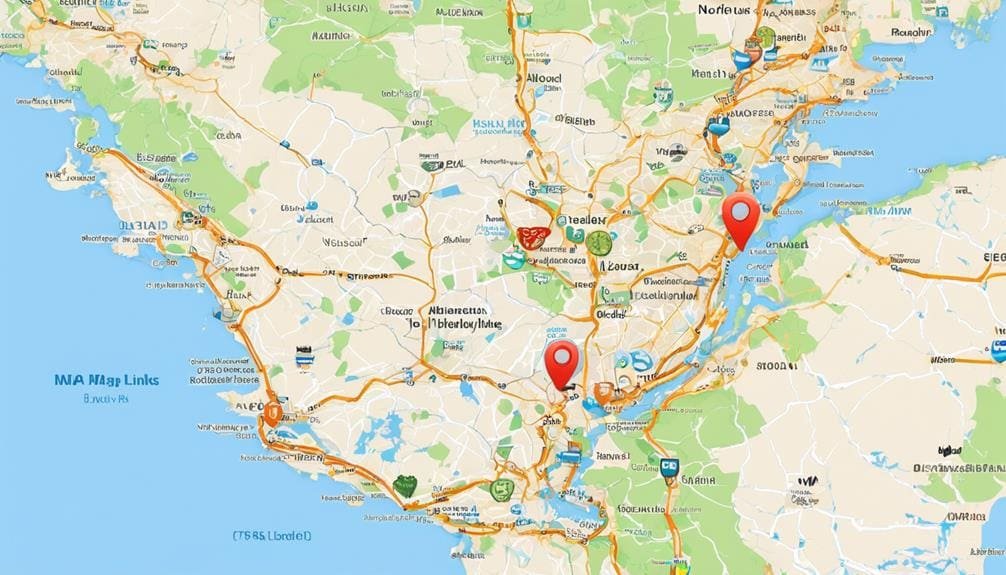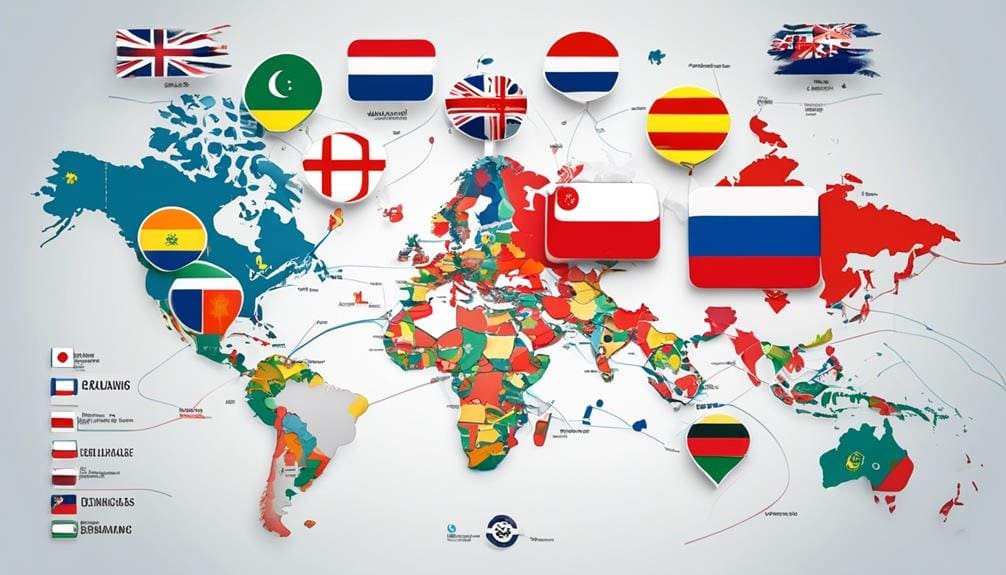
In the ever-evolving landscape of regional SEO, the art of meta tag optimization remains a pivotal force. With 13 key tactics at our disposal, we can wield these concise and descriptive tags to fortify our regional presence. From strategically placing primary keywords to incorporating compelling modifiers, the potential for local visibility is vast. However, the intricacies of meta description best practices, header tags for local relevance, and the utilization of schema markup for regional businesses beckon our attention. As we delve into the nuances of image alt attributes for local SEO and the multilingual meta tag strategy, the path to regional SEO success becomes clearer.
Title Tag Optimization
Title tag optimization is a critical aspect of SEO that significantly impacts search engine rankings and user engagement. When it comes to meta tags, the title tag plays a crucial role in signaling the content and relevance of a web page to search engines. By including relevant keywords in the title tag, webmasters can enhance the page's visibility and attract organic traffic. It's important to note that Google no longer requires an exact match keyword in the title tag to understand a page's topic, but it's still essential to include relevant keywords to improve the page's discoverability. Keeping the title tag under 60 characters and incorporating longtail keywords can further amplify its impact on SEO. Furthermore, crafting unique and compelling title tags for each web page can prevent keyword cannibalization and enhance the overall effectiveness of SEO efforts. Well-optimized title tags can significantly increase clicks and traffic to a webpage, ultimately influencing its rankings in search engine results. Therefore, meticulous title tag optimization is paramount for webmasters aiming to improve their site's visibility and performance on search engines.
Meta Description Best Practices

When crafting meta descriptions, incorporating relevant keywords and maintaining conciseness are key factors for enticing users to click on search results. Meta descriptions, a type of meta tag, remain important for search engines, as they provide a brief summary of the content on a web page. It's crucial to create unique and compelling meta descriptions for each page, using relevant keywords that accurately reflect the content. Researching competitors' meta descriptions can offer valuable insights for crafting effective descriptions. Properly optimized meta descriptions can improve click-through rates, indirectly impacting the ranking of the page in search results.
Including keywords in the meta description can make them appear in bold on the search engine results page (SERP), drawing attention to the listing. It's essential to create engaging meta descriptions that encourage users to click through to the website. By using persuasive language and providing a clear value proposition, meta descriptions can significantly impact the click-through rate from search results. Ensuring that meta descriptions are both informative and enticing is crucial for maximizing their effectiveness in driving organic traffic to the website.
Header Tags for Local Relevance

We emphasize the importance of using H1-H6 header tags to signal local relevance and incorporate location-specific keywords. Including city or region names in header tags is crucial for optimizing local context and improving visibility in regional searches. Our data-driven approach highlights the impact of regional headers in enhancing local SEO performance and signaling local relevance to search engines.
Localized Header Tag Importance
Implementing localized header tags, such as H1 and H2, can significantly enhance local SEO by signaling the geographic relevance of a page's content to search engines. Utilizing location-specific keywords in header tags is a crucial aspect of an effective SEO strategy, as it enhances the local context of a webpage, thereby improving its visibility in Google search results. Including local business information, such as city names or service areas, in header tags can positively impact a website's ranking signals and improve its visibility for location-based searches. Moreover, properly structured header tags with local keywords not only boost SEO but also enhance the user experience for local visitors by providing targeted and relevant content. Leveraging header tags to prominently feature localized content and information reinforces the geographical relevance of a website, thereby benefiting regional SEO efforts. Geo tags in header tags are a powerful tool to improve your website's visibility and drive local traffic.
Location-Specific Header Tags
Location-specific header tags play a crucial role in enhancing the local relevance and visibility of a webpage for regional SEO by incorporating localized information within the header structure. These tags, which include elements such as location-specific keywords, business address, and contact information, contribute to improved visibility in search engine results pages (SERPs) for local audiences. Incorporating city or region-specific terms in header tags can boost local SEO performance and enhance the website's visibility for local audiences. By utilizing structured data markup helpers and adhering to best practices such as the Open Graph protocol, websites can optimize their header tags for specific locations without resorting to keyword stuffing. This strategy is essential for achieving higher visibility in search results and attracting local traffic.
Impact of Regional Headers
Incorporating region-specific keywords in header tags significantly enhances a webpage's local relevance and visibility for regional SEO. This impact on regional headers is a crucial aspect of search engine optimization. Here's how regional headers can positively impact local SEO:
- Improved Local Relevance: Using location-specific keywords in header tags helps web pages appear more relevant to local searches.
- Enhanced Visibility: Optimizing header tags with regional terms can improve the visibility of a website in regional searches.
Image Alt Attributes for Local SEO

Utilizing location-specific keywords in image alt attributes enhances the relevance of images for local SEO, contributing to improved discoverability and visibility in image searches. Image alt attributes provide text descriptions for images, aiding search engines in understanding local content. By optimizing alt attributes with location-specific details, the local relevance and discoverability of images can be improved. Alt attributes influence image search results and can contribute to local visibility in image searches. Furthermore, descriptive alt attributes for images can enhance user experience and accessibility, thereby supporting local SEO efforts. Incorporating location-specific keywords in alt attributes enhances the association between the images and the local area, potentially impacting search engine rankings for location-based queries. As a result, including relevant location-specific terms in alt attributes is essential for local SEO strategies, as it can directly impact the visibility of images within the local market. Therefore, when optimizing meta tags for local SEO, including location-specific keywords in image alt attributes is crucial for improving the local relevance and discoverability of images on a webpage.
Schema Markup for Regional Businesses

Implementing schema markup for regional businesses offers numerous benefits, including improved local search visibility and enhanced user experience. By utilizing schema markup specific to regional businesses, such as local business schema and address markup, we can effectively convey location details and operating hours to search engines. Additionally, incorporating region-specific schema types, such as event schema for local events and organization schema for community initiatives, can further boost a business's visibility in regional searches.
Local Business Benefits
Schema markup enhances the online presence of local businesses by providing search engines with specific details about their products, services, and location. When regional businesses utilize schema markup, they can benefit in various ways:
- Enhanced visibility in local search results, attracting nearby customers
- This can lead to an increase in web and foot traffic, ultimately boosting sales and revenue.
- Highlighting important information like operating hours, contact details, and customer reviews
- This makes it easier for potential customers to find and engage with the business, whether through search engines, social media, or other online platforms.
Implementing Schema Markup
Regional businesses can significantly enhance their local search visibility and user engagement by integrating schema markup into their online presence. Schema markup provides structured data that enables search engines, like Google, to better understand and represent a business's information in search results. By incorporating schema markup into a website's HTML code, regional businesses can provide search engines with detailed information about their products, services, and geographic location. This, in turn, can lead to more relevant search results for local users and improve the chances of being featured in rich snippets on search engine results pages. Implementing schema markup for regional businesses not only bolsters local SEO efforts but also facilitates the display of additional information, such as customer reviews and ratings, directly in search results, ultimately building trust and credibility with local audiences.
Schema Types for Regions
With the integration of schema markup into a regional business's online presence, the structured data provides essential geographic context that aids search engines in understanding and representing the business's information, ultimately enhancing local search visibility and user engagement. When considering schema types for regions, it's crucial to focus on the following:
- Local Business Schema
- Utilizes structured data to provide detailed information about a business, including its physical location and contact details.
- Enhances the display of business information in search results, contributing to improved visibility in local searches.
Nofollow Attributes for Local Links

When implementing nofollow attributes for local links, it is essential to consider their impact on the distribution of link equity in regional SEO strategies. Nofollow attributes can prevent the passing of link equity to search engines for specific linked pages, which can be beneficial when linking to low-quality or harmful local websites. Proper use of nofollow attributes in local links is a good practice for regional SEO, especially for user-generated content links in local contexts. It allows webmasters to control the flow of link equity within their websites.
Applying nofollow attributes to internal local links that don't require crawling by search engines can also help optimize the distribution of link equity in regional SEO strategies. Moreover, local pages with thin or irrelevant content for specific regions can benefit from the content=noindex meta tag value to avoid wasting crawl budget. This combined approach of utilizing nofollow attributes for local links and employing relevant meta tags can significantly enhance the effectiveness of regional SEO strategies, ensuring that the link equity is appropriately distributed and the webpage is descriptive and relevant to local keywords.
Canonical Tags for Regional Content

To maximize the impact of regional content in search engine results, the implementation of canonical tags is crucial for indicating the original or preferred version of a webpage for localized search results. When it comes to regional SEO, incorporating canonical tags offers several advantages:
- Avoiding Duplicate Content: Canonical tags help in steering search engines to the primary version of a webpage, thus preventing the indexing of duplicate content across regional variations.
- Consolidating Ranking Signals: By specifying the canonical URL, these tags assist search engines in consolidating ranking signals for the same content across different regional versions, ultimately contributing to improved SEO performance.
Proper implementation of canonical tags ensures that search engines understand the geographical targeting of web pages and serve the appropriate versions to users. Moreover, when used correctly, canonical tags contribute to a more localized and targeted search engine optimization strategy, thereby enhancing the visibility and relevance of regional content in search engine results.
Hreflang Attributes for Local Languages

When implementing hreflang attributes for local languages, it's essential to consider language-specific targeting and regional language variations. By utilizing hreflang tags, we can ensure that search engines display the most relevant language and regional version of a webpage to users based on their location and language preferences. Properly implementing hreflang attributes is a critical component of international SEO strategy and can significantly impact a website's visibility and performance in local markets.
Language-Specific Targeting
Implementing hreflang attributes for language-specific targeting is a crucial aspect of international SEO, allowing websites to serve tailored content based on user language preferences and regional contexts. When considering language-specific targeting, it's essential to understand the following:
- Hreflang attributes are added to indicate language and regional targeting, ensuring that search engines serve the most relevant content to users.
- This structured data prevents issues such as duplicate content across different language versions of the same page, enhancing the overall user experience and SEO performance.
- Proper implementation of hreflang attributes can significantly improve the visibility and ranking of web content for diverse language and geographic audiences, making it a vital component of regional SEO strategies.
Regional Language Considerations
Considering the diverse language preferences and regional contexts, effective utilization of hreflang attributes is paramount for seamlessly presenting web content in local languages to target regional audiences. Hreflang tags are crucial meta tags for regional SEO, enabling search engines to understand language and regional targeting, and ensuring that users are directed to the most relevant version of a webpage based on their language and location. Implementing hreflang attributes is essential for catering to diverse language preferences and regional variations. It allows for the proper display of title tags, meta descriptions, structured data, and open graph tags in local languages, thereby enhancing the overall user experience and search engine visibility. In essence, incorporating hreflang attributes for local languages is a fundamental aspect of regional SEO, enabling websites to effectively reach and engage with their target audiences.
Social Media Meta Tags for Local Engagement

To enhance local engagement on social media, incorporating location-specific information into social media meta tags can effectively target regional audiences and improve interaction with the local community. When optimizing social media meta tags for local engagement, it is crucial to consider the following tactics:
- Utilize Local Keywords: Including local keywords in meta tags can significantly improve relevance and visibility for local audiences on social networks. It is essential to research and incorporate keywords that are relevant to the specific region or locality.
- Example: Incorporating the name of the city or region in meta tags can make the content more relevant to local search queries and social media users in that area.
- Leverage Regional Hashtags and Mentions: Integrating regional hashtags and mentions within meta tags can enhance the discoverability of content among local audiences on social platforms. This can lead to increased engagement and interaction with the local community.
- Example: Using popular local hashtags or mentioning local businesses or events in meta tags can attract the attention of local users, driving higher engagement and interactions.
Viewport Tag for Mobile Local Search

We have observed that the proper implementation of the viewport tag is pivotal in ensuring an optimal mobile search experience for local users, directly impacting the visibility and usability of web content on mobile devices. The viewport tag plays a crucial role in making web pages mobile-friendly for local search. It defines how a webpage is displayed on mobile devices, impacting user experience for local searches. Proper usage of the viewport tag can improve mobile search rankings for local businesses. It ensures that web content is properly sized and adjusted for mobile screens, enhancing local search visibility. Optimizing the viewport tag is essential for providing a seamless mobile search experience for local users.
In the realm of important meta tags for regional SEO, the viewport tag stands out as a key element for mobile local search. Its proper implementation can significantly enhance the user experience and ultimately impact the search engine rankings for local businesses. As mobile searches continue to dominate the online landscape, prioritizing the optimization of the viewport tag is essential for businesses aiming to improve visibility and engagement on mobile devices.
Geo Meta Tags for Regional Targeting

The crucial role of meta tags in optimizing web content for local searches is further exemplified by the use of geo meta tags, which provide specific location-based information to search engines for regional targeting. When implementing geo meta tags for regional SEO, it is essential to consider the following:
- Geographical Relevance: Geo meta tags help search engines understand the geographical relevance of web content for local search results. By providing specific location-based information, websites can improve their visibility in regional searches.
- Hreflang Tags: In addition to geo meta tags, utilizing hreflang tags is crucial for serving the correct language and regional versions of web pages to users. This ensures that search engines direct users to the most relevant and appropriate regional content.
In the realm of regional SEO, the effective use of geo meta tags, in conjunction with other meta tags such as keywords tag, title and description tags, and open graph tags, plays a pivotal role in optimizing web content for local and regional strategies. By adhering to best practices for implementing geo meta tags, websites can significantly enhance their performance in regional search results.
Local Business Structured Data

Local Business Structured Data provides businesses with a powerful tool for enhancing their visibility and relevance in local search results by presenting specific information in a format that search engines can readily interpret. By implementing local business structured data, businesses can provide search engines with crucial details such as their name, address, phone number, operating hours, and relevant keywords. This structured data enables search engines to understand the context of the information, which can improve the business's chances of being featured in rich snippets and appearing in location-based searches and local map packs. Moreover, local business structured data helps businesses avoid duplicate content issues and stand out in local search results, ultimately enhancing their online presence and trustworthiness with potential customers. When used effectively, this meta tag tells search engines about the business's physical location, service area, and other relevant details, providing additional information that can influence search engine rankings and overall visibility in local searches.
Multilingual Meta Tags Strategy

When implementing a multilingual meta tags strategy, it is crucial to accurately translate and optimize meta tags in multiple languages to effectively reach a wider audience and improve international SEO. Here are essential tactics for a successful multilingual meta tags strategy:
- Use Relevant Keywords: Incorporate relevant keywords in meta tags for each language to enhance the visibility of the webpage in different language regions.
- Utilize Localized Keywords: Tailor keywords to match the search patterns and preferences of users in specific language regions.
- Implement Hreflang Tags: Hreflang tags are essential for indicating language and regional targeting in multilingual meta tags strategy.
- Ensure Correct Implementation: Properly implement hreflang tags to signal to search engines the language and regional targeting of each webpage.
Frequently Asked Questions
How Do I Optimize Meta Tags for Seo?
We optimize meta tags for SEO by crafting compelling title tags, informative description tags, and relevant image alt text. We incorporate local keywords, employ a geotargeting strategy, and integrate regional language and niche-specific meta tags. Additionally, we ensure mobile-friendly meta tags for improved visibility.
What Are Meta Tag Keywords for Seo?
We use meta tag keywords for SEO to enhance local targeting, regional relevance, and user intent. Our strategies involve in-depth keyword research, geotagging content, and competitor analysis to optimize on-page content with long-tail keywords.
How to Optimize Meta Keywords on SEO & Their Suggested Character Length?
Optimizing meta keywords is no longer a current SEO strategy, given their negligible impact on rankings. Instead, focus on optimizing titles, descriptions, and structured data for local search. The suggested character limit for meta keywords is 0.
What Is Metadata for Seo?
Meta tag basics are crucial for SEO. Understanding the importance of metadata and using best practices for meta descriptions can benefit regional SEO. Optimizing meta tags for local search, following length guidelines, and implementing geo-targeting strategies improve regional keyword research.
RELATED POSTS
View all



